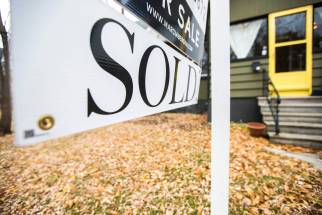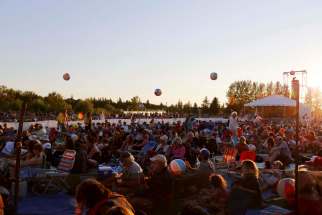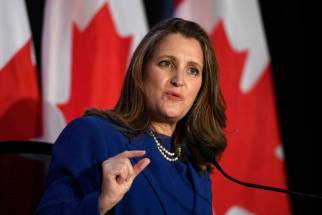Federal budget seeks impact on ‘frenetic’ Winnipeg housing market
Read this article for free:
or
Already have an account? Log in here »
To continue reading, please subscribe:
Monthly Digital Subscription
$0 for the first 4 weeks*
- Enjoy unlimited reading on winnipegfreepress.com
- Read the E-Edition, our digital replica newspaper
- Access News Break, our award-winning app
- Play interactive puzzles
*No charge for 4 weeks then price increases to the regular rate of $19.00 plus GST every four weeks. Offer available to new and qualified returning subscribers only. Cancel any time.
Monthly Digital Subscription
$4.75/week*
- Enjoy unlimited reading on winnipegfreepress.com
- Read the E-Edition, our digital replica newspaper
- Access News Break, our award-winning app
- Play interactive puzzles
*Billed as $19 plus GST every four weeks. Cancel any time.
To continue reading, please subscribe:
Add Free Press access to your Brandon Sun subscription for only an additional
$1 for the first 4 weeks*
*Your next subscription payment will increase by $1.00 and you will be charged $16.99 plus GST for four weeks. After four weeks, your payment will increase to $23.99 plus GST every four weeks.
Read unlimited articles for free today:
or
Already have an account? Log in here »
Hey there, time traveller!
This article was published 08/04/2022 (1340 days ago), so information in it may no longer be current.
Marc Lagace toured about 90 homes around Winnipeg last spring, and was about to throw in the ownership towel when he finally found his match in St. James.
Thursday’s federal budget aims to reverse trends that make house buying all but possible for millennials like Lagace.
“It’s disheartening,” the 33-year-old said. “You’re trying to not pay rent and buy equity in a house, (just) to be priced out of most of the houses you’re looking at.”
The federal budget allocates $10 billion for initiatives meant to double the annual number of homes being built in 10 years, and help Canadians pay for homes.
The measures include a $4-billion accelerator fund that will reward municipalities who help get housing built, for a target of 100,000 new units over five years.
Ottawa will fast-track existing funds for developers of mixed-income buildings, turning some loans into grants. There’s also a top-up to a popular program for non-profits to convert derelict buildings into low-income apartments.
That’s on top of various energy-retrofit grants and $4.3 billion for housing in Indigenous communities.
The budget also calls for regulatory changes to address issues plaguing Toronto and Vancouver, such as people who don’t live in Canada buying homes that sit empty, and companies that buy up homes to rent them at high rates.
While Thursday’s commitments lacked detail, the Winnipeg Regional Real Estate Board argues the measures will address the supply gaps that have made the local market unrecognizable from just two years ago.
“It’s disheartening. You’re trying to not pay rent and buy equity in a house, (just) to be priced out of most of the houses you’re looking at.”
– Marc Lagace
“It’s frenetic, with a serious imbalance,” said the group’s market analyst, Peter Squire.
A January analysis by Scotiabank found Manitoba has the third-lowest per capita amount of homes per population. The province would need 23,000 units to bring it up the national average of homes per person — which still trails other G7 countries.
Lagace saw the impact of that shortage during an intense three months in spring 2021. He and his partner toured five to eight houses each weekend, putting in offers in the rare occasions when there weren’t already several in place.
Federal health budget not up to snuff: Manitoba

Posted:
Manitoba Finance Minister Cameron Friesen panned the Trudeau government’s budget for failing to deliver a substantial increase to health transfers to provinces.
“You feel if you don’t look one weekend, you’re going to miss out on the deal that you need,” said Lagace, who works in sales.
Homes often ended up going for $100,000 above asking price.
Some houses requiring $20,000 in renovations were out of his reach.
It was a shock for Lagace, who grew up in a city that prides itself on having a more affordable housing market than larger Canadian cities. “The cost of housing is going up, as is the cost of appliances and everything else.”
He shelved his dream of buying an older house around the River Heights neighbourhood. He expanded his search to areas such as Transcona and eventually landed a place he loves in St. James.
“We didn’t do any house inspection, or anything like that, because there’s no time or option, because the seller’s going to go for someone else,” he said.
Thursday’s budget aims to entrench a right for homebuyers to do inspections, and to have realtors publish more data.
Squire said the Winnipeg market followed national trends in the COVID-19 pandemic, when low interest rates and a demand for more space sent demand for houses soaring.
Normally, the Winnipeg market has enough four to five months of inventory, meaning that if a theoretically freeze happened and no homes entered the market, it would take that long to absorb the supply. That buffer has dropped to just one month overall, and even less for single-family detached houses.
“The cupboard’s bare and we have to restock, and we’ve got all these disappointed buyers.”
– Winnipeg Regional Real Estate Board analyst Peter Squire
“The inventory’s been depleted, because we had so much activity that can only be sustained for so long,” said Squire.
He said it’s created a snowball effect, with because homebuyers spending months making offers are competing with new people making their first bid. He said that will be hard to reverse, especially now because housing demand usually grows each spring.
“The cupboard’s bare and we have to restock, and we’ve got all these disappointed buyers.”
Ottawa plans to use tools to push provinces and cities to make more housing available, including making some infrastructure and transit funds contingent on rules having rules that incentivize building. Squire said Winnipeg officials have already been taking those steps, by simplifying some processes and digitizing paperwork.
The city also isn’t constrained by a coastline or bordering a large protected area, unlike some major Canadian centres.
If anything, infill construction has been an issue in Winnipeg, he argues, with community concerns delaying rezoning for developments in areas such as Waverley West and Sage Creek.
“Our challenge in Winnipeg is more NIMBY (not in my backyard). We have some resistance to allowing more infill within the spaces in the city that we have,” said Squire.
He said getting more cash into homebuyers’ hands is the most important part of Thursday’s budget.
A new tax-free first home savings account will allow Canadians to save up to $40,000 to put toward a house, which Squire said will have an outsize impact in a city with relatively cheaper homes. “It’s really a strong vehicle, which will help first-time buyers save up money to put toward a new payment.”
But Lagace was skeptical of how much those saving measures will help people who have little to squirrel away.
“It’s good system for some people, but it’s not a universal thing that will help everyone,” he said. “If you’re on a month-to-month budget, that doesn’t really help.”
The Manitoba Non-Profit Housing Association had similar concerns.
“The amount that they’ve added to the budget is still not enough to affect core housing need in Manitoba, in any serious way,” said association head Christina Maes Nino.
The group was happy to see increases to Ottawa’s funding for co-operative housing, and said the incentive for municipalities to get housing built could work if it’s targeted toward affordable rental units. But it feared some of the saving measures for homebuyers will add more pressure to an overheating market.
Robert Asselin, an executive with the Business Council of Canada who previously helped craft a handful of Liberal government budgets, was particularly worried about the savings initiatives.
“That will not choke demand, if anything it will raise demand because you’re incentivizing people to actually buy houses — and it will benefit more of the wealthy,” he said. “Housing, I think, is the weakest part of their budget.”
The Liberals strongly disagree, arguing they’re putting in measures that will allow families to build up savings as new houses get built.
The Trudeau government argues the current bottleneck in the housing market will constrain the economic and population growth Canada needs.
“A home is a linchpin for growth in the city of Winnipeg,” said Winnipeg South MP Terry Duguid, whose riding is one of the fastest growing in the Prairies.
“More families will be able to afford a home and help out community to keep growing, to increase our tax base (and) the number of skilled workers.”
dylan.robertson@freepress.mb.ca
History
Updated on Friday, April 8, 2022 10:08 PM CDT: Corrects spelling of Squire









